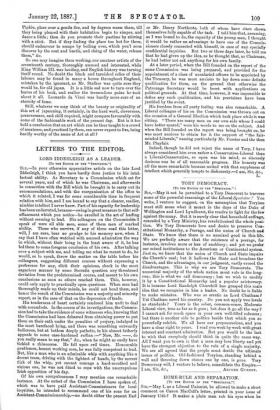LETTERS TO THE EDITOR.
LORD IDDESLEIGH AS A LEADER.
go THE EDITOR OF THE " SPECTATOR:1
your otherwise appreciative article on the late Lord Iddesleigh, I think you have hardly done justice to his intel- lectual ability. As Secretary to a Commission which sat for several years, and of which he was Chairman, and afterwards In connection with the Bill which he brought in to carry out its recommendations, and with the reorganisation of the office to which it related, I was for some considerable time in frequent relation with him, and I am bound to say that a clearer, readier, nimbler intellect I never knew. Part of his capacity for leadership has been underrated, because—owing in great measure to that self-
effacement which you notice—he excelled in the art of leading without seeming to lead. His colleagues on the Commission I speak of were all able men, some of them men of marked ability. Those who survive, if any of them read this letter, will, I am sure, bear no grudge to his memory now, when I say that I have often watched with amused admiration the way in which, without their being in the least aware of it, he has 'led them to some foregone conclusion of his own. After talking over a subject with me, and telling me what he meant to do, he would, so to speak, throw the matter on the table before his colleagues, suggesting different courses without expressing a preference for any, elicit their opinions, check in the most -sagacious manner by some Socratic question any threatened deviation from the predetermined course, and assent to his own conclusions as soon as others reached them. This, however, could only apply to practically open questions. When men had thoroughly made up their minds, he could not bend them, and hence the result of the Commission was a majority and minority report, as in the case of that on the depression of trade.
His tenderness of heart certainly rendered him unfit to deal
with scoundrels. In the course of its investigations, the Commis- sion had to take the evidence of some witnesses who, knowing that the Commission had been debarred from obtaining power to put them on their oath under the penalties of perjury, indulged in -the most barefaced lying, and there was something outwardly ludicrous, but at bottom deeply pathetic, in his almost fatherly appeals to some case-hardened ruffian :—" Now, Mr. —, do you really mean to say that," &c., when he might as easily have tickled a rhinoceros. He fell upon evil times. Honourable gentlemen, honest working men, he was fully competent to lead. But, like a man who is an admirable whip with anything like a decent team, driving with the lightest of hands, by the merest flick of the whip, yet cannot manage a hard-mouthed and vicious one, he was not fitted to cope with the unscrupulous Irish opposition of his day.
Of his own scrupulousness I may mention one remarkable instance. At the outset of the Commission I have spoken of, which was to have paid Assistant-Commissioners for local inquiries, he intended to recommend one of his sons for an Assistant-Commissionership,—no doubt either the present Earl or Mr. Henry Northeote, both of whom have since shown themselves fully capable of the task. I told him that, assuming, as I was bound to do, the capacity of the young man, I thought it would be rather an advantage to have one of the Commis- sioners closely connected with himself, in case of any specially confidential inquiries. But two or three days later, he told me that he had given up the idea, as he thought that, as Chairman, he had better not ask anything for his own family.
At a later period, when the Bill founded on the report of the same Commission was being prepared, and provided for the appointment of a class of unsalaried officers to be appointed by- the Treasury, he was most anxious to lay down some definite qualification for them, on the ground that otherwise the Patronage Secretary would be beset with applications on political grounds. At that time, however, it was impossible to define any such qualification, and his previsions have been justified by the event.
His freedom from all party feeling was also remarkable. A Liberal colleague of his on the Commission was thrown out on the occasion of a General Election which took place while it was sitting. "There are many men on our own side whom I could have better spared," were his words to me on the subject. And when the Bill founded on the report was being brought on, he was most anxious to obtain for it the support of "the fair- minded Liberals," naming particularly Mr. Forster and the then Mr. Playfair.
Indeed, though he did not reject the name of Tory, I have always considered him even rather a Conservative-Liberal than a Liberal-Conservative, so open was his mind, so sincerely desirous was he of all reasonable progress. His honesty was all the more remarkable because united with that suppleness of intellect which generally tempts to dishonesty.—I am, Sir, die., L.


































 Previous page
Previous page